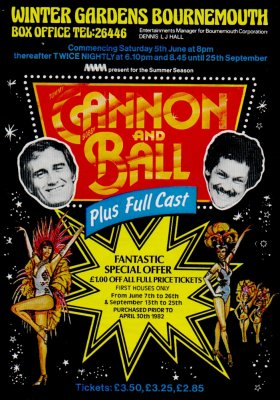
Sat 5th Jun – Sat 25th Sept, 6:10pm and 8:45pm.
£2.85-£3.50 admission.
Souvenir Brochure

Programme Notes
The rise of Cannon and Ball to becoming the most consistently ‘in demand’ double act in the country is one of real success. Success that can be measured in the respect of admiration of their fellow artistes and the loyalty of their ever growing audiences. The Cannon and Ball story is one of talent, hard work, and continual striving for perfection. This dedication is amply demonstrated nightly when they ‘top the bill’ at the country’s leading cabaret clubs and theatres.
There cannot be many artistes today who are kept as busy as Cannon and Ball. But their success is no accident and it has been hard won. Although neither Tommy Cannon nor Bobby Ball were born into theatrical families, they each discovered at an early age a natural talent for entertaining. Bobby Ball remembers many occasions when, with his sisters, he sang at impromptu lunchtime concerts at the various cotton mills in his Lancashire home town of Shaw.
It was in 1961 that Cannon and Ball first worked together, not as entertainers but as welders for a North West engineering company. It was here that their unique chemistry interacted and their stage relationship developed.
Tommy Cannon (slightly senior) befriended the young recruit. “Tommy used to look after me when I got into trouble” (Bobby Ball). As their freindship developed, comic possibilities began to suggest themselves. “We were always fooling about for the lads at work” (Tommy Cannon)
Encouraged by an enthusiastic response at work, they would often be found in the evenings entertaining a wider audience. For this part of homely Lancashire is still the guardian of the music hall tradition. Talent shows and social clubs still play an active part in the community. It was to these that Cannon and Ball turned.
Initially they performed as a singing duo. “I used to sing” recalls Bobby Ball, “and Tommy would accompany me on the drums, then we would swap over and Tommy would sing to my accompaniment – all for �3.00 a night.
However, their talent for comedy soon began to enter the act. Comedy entirely original and unique: comedy loosely based on their working relationship as welders. As the act began to develop through their many appearances in the pubs and social clubs of South East Lancashire, they began to look out for opportunites outside their native area. As their appearances increased and confidence grew, it soon became evident that engineering would have to survive without them.

In 1963, Cannon and Ball were offered a series of booking by a London agent. Although this promise did not always live up to their expectations at least they had taken the opportunity to enter showbusiness.
Working mainly in social clubs in the north of England, Cannon and Ball can look back at overcoming some of the toughest audiences in the country. Lesser artistes have not survived these most demanding and discriminating audiences. Cannon and Ball not only survived, but learned how to build a following whose loyalty and affection is now the envy of many top artistes.
After two years, Cannon and Ball started to attract attention outside the north of England. In 1965 they began to appear throughout the country. It was now that their earlier tough apprenticeship proved invaluable. They were quickly able to overcome many of the problems that some northern comedians experience when appearing outside their region. Never having to rely on dialect or stories, their zany style needed only subtle changes.
In 1970/72 Cannon and Ball undertook tours to Australia and South Africa for cabaret and radio work.
In Britain their national reputation has continued to grow. They have made several television appearances to date, both for the BBC and various independent television companies, including a series of Bruce Forsyth’s Big Night Out for London Weekend, and their own Cannon and Ball at the Wheeltappers for Granada.
Since 1975 Cannon and Ball have regularly appeared during pantomime seasons at the Alhambra (Bradford), Grand (Leeds), Davenport (Stockport), and in 1978 at the Empire (Liverpool). The same period has seen them topping the bill in summer seasons at the Winter Gardens (Bournemouth), Behans Night Spot (Jersey), The Pier (Cleethorpes), and The Wellington Pier (Great Yarmouth).
Few acts in the country today can obtain such a wide range of responses from an audience. The quickly chaning ‘love/hate’ relationship from Tommy Cannon to Bobby Ball in their act is based on masterly timing and knowing how to “work an audience”. The pathos and sympathy extended to the rejected Bobby Ball and the animosity towards Tommy Cannon, who refuse’s his partners friendship, is clearly based on their early experiences.
In the autumn of 1978 Cannon and Ball undertook a nationwide tour with the American singer Gene Pitney, appearing at the London Palladium and other major theatres and concert halls.
Cannon and Ball can justifiably feel pleased with their progress to date. They are now one of the foremost comedy acts in the country starring on their own TV series and this coming Christmas they are booked for Londons Great Christmas Spectacular at the Dominion Theatre.
With the continual encouragement of Stuart Littlewood, the ex-welders from Oldham have come a long way. With their perfect timing and their flexibility to play any audience, it is easy to see why Cannon and Ball are so much sought after as stars in Britains cabarets and theatres. “ROCK ON TOMMY”.
Following the success of their recent television series, Cannon and Ball are now firmly established as one of Britain’s leading entertainment atractions, and are currently breaking all box office records.
Also starring
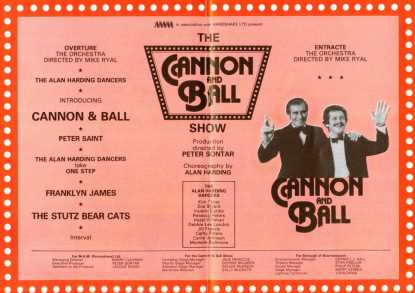
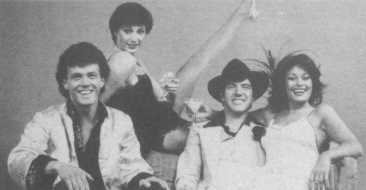
The Stutz Bear Cats (Chris Hennan, Jane Beaumont, Belinda Cryer, Mick Mullane)
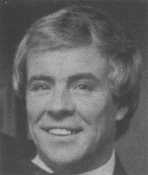 |
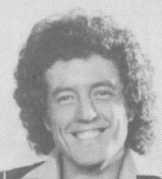 |
| Franklyn James | Peter Saint |
The Mike Ryal Orchestra
The Alan Harding dancers